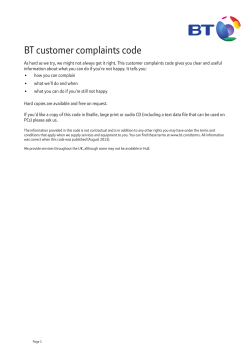
Complaints leaflet - St Ann Street Medical Practice
St Ann Street Medical Practice Weekend Telephone Triage Scheme Making a Complaint Who can complain? Anyone who is receiving, or has received, NHS treatment or services can complain, as can anyone affected by the outcome of actions. If you are unable to make a complaint yourself, then someone can act on your behalf with your written consent. Young persons (under age 18) are entitled to complain independently. The NHS cannot consider a complaint made on behalf of a young person unless they are sure that the young person is unable to complain themselves. What information will be needed to make my complaint? Your name, address and contact telephone number and those of the person that you may be complaining for; including their date of birth and their NHS number. A summary of what has happened, giving dates where possible. A list of things that you are complaining about What you would like to happen as a result of your complaint. What can I expect? A member of the complaints team will contact you and agree the best way forward for investigating your complaint, taking into account your desired outcome. The issues will be fully investigated and you should then receive your response (which can be a written response or a meeting with relevant staff) within the agreed timescales. Please do not worry about the service you receive in future being adversely affected because 1 you have made a complaint. We take all comments seriously and only use the information to review our services and make improvements, where needed. If you are the patient concerned, you can complain about your own care. You are unable to complain about someone else’s treatment without their written authority. See the separate section in this leaflet. At the back of this leaflet, you will find the complaints form to register your complaint and a third-party authority form to enable a complaint to be made by someone else. Send your written complaint to: PALS and Complaints Manager NHS Wiltshire Clinical Commissioning Group Southgate House Pans Lane Devizes SN10 5EQ. Their telephone number is 0300 123 2103 email wccg.complaintsandpals@nhs.net What we do next We look to settle complaints as soon as possible. We will acknowledge receipt within 3 working days, and aim to have looked into the matter within 10 working days. You may then receive a formal reply in writing, or you may be invited to meet with the person(s) concerned to attempt to resolve the issue. If the matter is likely to take longer than this we will let you know, and keep you informed as the investigation progresses. 2 When looking into a complaint we attempt to see what happened and why, to see if there is something we can learn from this, and make it possible for you to discuss the issue with those involved if you would like to do so. When the investigations are complete your complaint will be determined and a final response sent to you. Where your complaint involves more than one organisation (e.g. social services) we will liaise with that organisation so that you receive one coordinated reply. We may need your consent to do this. Where your complaint has been sent initially to an incorrect organisation, we may seek your consent to forward this to the correct person to deal with. The final response letter will include details of the result of your complaint and also your right to escalate the matter further if you remain dissatisfied with the response. Complaining on Behalf of Someone Else We keep to the strict rules of medical and personal confidentiality. If you wish to make a complaint and are not the patient involved, we will require the written consent of the patient to confirm that they are unhappy with their treatment and that we can deal with someone else about it. Where the patient is incapable of providing consent, due to illness or accident, it may still be possible to deal with the complaint. Please provide the precise details of the circumstances which prevent this in your covering letter. Please note that we are unable to discuss any issue relating to someone else without their express permission, which must be in writing, unless the circumstances above apply. 3 We may still need to correspond direct with the patient, or may be able to deal direct with the third party, and this depends on the wording of the authority provided. The period for making a complaint is normally: (a) 12 months from the date on which the event which is the subject of the complaint occurred; or (b) 12 months from the date on which the event which is the subject of the complaint comes to the complainant's notice. Complaints should normally be resolved within 6 months. Our standard will be 10 days for a response. The Complaints Manager has the discretion to extend the time limits if you have good reason for not making the complaint sooner, or where it is still possible to properly investigate the complaint despite extended delay. When considering an extension to the time limit it is important that the Complaints Manager takes into consideration that the passage of time may prevent an accurate recollection of events by the clinician concerned or by the person bringing the complaint. The collection of evidence, Clinical Guidelines or other resources relating to the time when the complaint event arose may also be difficult to establish or obtain. These factors may be considered as suitable reason for declining a time limit extension. 4 If, after the complaint procedure is completed, you do not feel your issue has been addressed, you may then contact NHS England to take the matter further:Email: England.contactus@nhs.net Telephone on 0300 311 2233 And, subsequently, if you remain unhappy with the outcome, it can be referred to the Parliamentary and Health Services Ombudsman (PHSO). The Ombudsman may investigate complaints, but only if this has already been investigated for local resolution. There is no charge for this service. The contact details are:The Parliamentary and Health Service Ombudsman Millbank Tower Millbank London SW1P 4QP Tel: 0345 015 4033 (open 08:30 – 17:30, Mon to Fri) Email: phso.enquiries@ombudsman.org.uk Website: www.ombudsman.org.uk Independent Complaints Advocacy Service (ICAS) If you would like to receive independent advice from someone about the complaints process, you should contact the S.E.A.P Advocacy Service who offers help and support to those wishing to make a formal complaint about the NHS and can help you to write your letter of complaint and accompany you to any meetings. Telephone: 0330 440 9000 Email: hastings.office@seap.org.uk 5 Fax: 01424 204687 Website: http://www.seap.org.uk/local-authority/bath-north-eastsomerset.html COMPLAINT FORM Your name and title The name of the patient, if it is not yourself Patient’s date of birth Your address: Your telephone number Details of your complaint Please include dates, times and names of personnel if known; and what happened. 6 SIGNED…………………………………. Date………………………. Patient Third Party Consent Form If you are complaining on behalf of someone else, please use this form. The patient’s name and title: Their address: Their telephone number: Your name and title: Your address: Your telephone number: The patient must sign this statement: I fully consent to my doctor releasing information to, and discussing my care and medical records with the person named above in relation to this complaint only, and I wish this person to complain on my behalf. This authority is for an indefinite period / for a limited period only (delete as appropriate) Where a limited period applies, this authority is valid until (insert date) __________ 7 Signed: ………………………………………. (Patient only) Date: ………………………………………….. 8
© Copyright 2025









